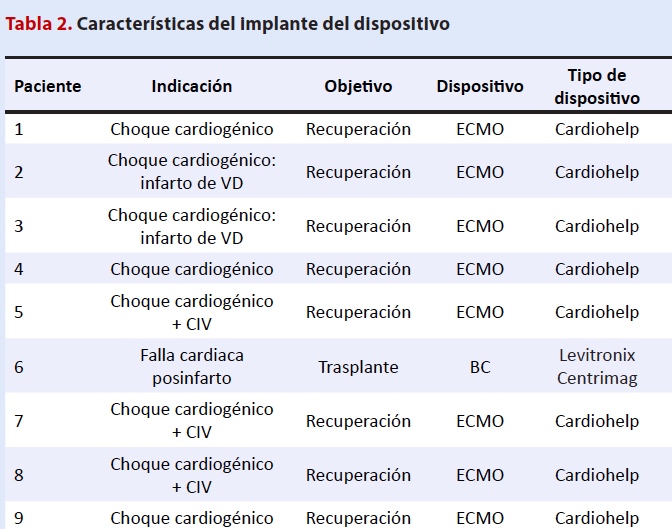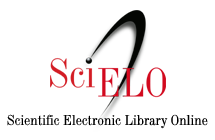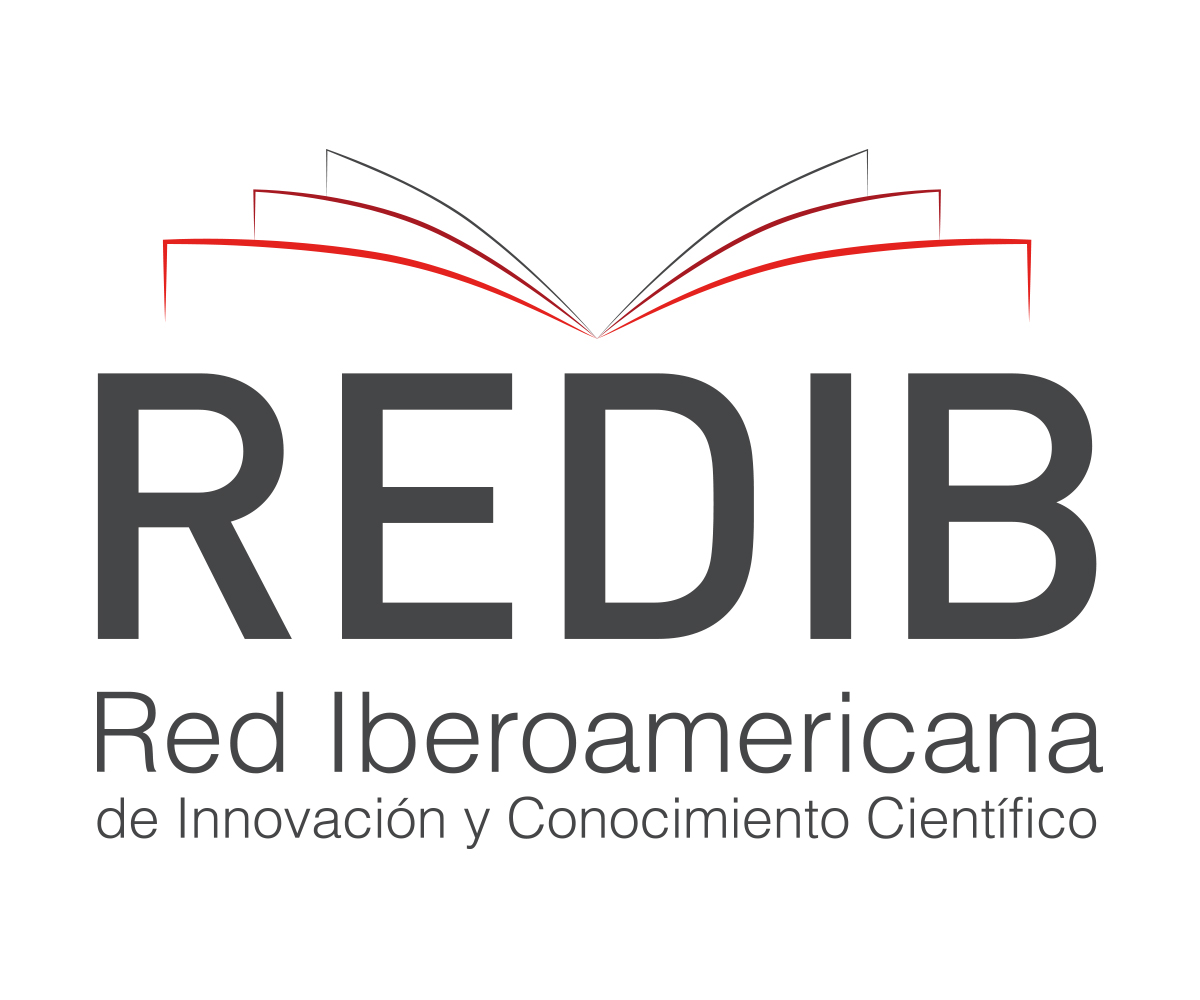The 5-year experience in short-term circulatory support in post myocardial infarction patients: a report from INCORMACS registry
DOI:
https://doi.org/10.47487/apcyccv.v1i3.76Keywords:
cardiogenic shock, acute myocardial infarction, Mechanical circulatory support device, Extracorporeal membrane oxigenationAbstract
Objective. To determine the clinical and epidemiological characteristics of patients with short-term mechanical circulatory support devices (MCSD) after myocardial infarction (MI) at a national referral hospital.
Materials and methods. Descriptive, retrospective study of post-MI patients in whom short-term mechanical circulatory support devices were implanted from 2015 to 2020.
Results. Nine mechanical support devices were implanted, in the same number of patients due to cardiogenic shock post MI. All patients were men with ST-elevation myocardial infarction (STEMI). Eight extracorporeal membrane oxygenation devices (ECMO) and one centrifugal flow pump (in LVAD configuration) were implanted. The median time of use of the devices was eight days. The most frequent complications were non-fatal bleeding (55.6%), acute kidney injury (44.4%) and sepsis (44.4%).In-hospital mortality was 55.6 %.
Conclusions. The use of short term MCSD after myocardial infarction is still limited in our institution and its main representative is the ECMO post STEMI complicated by cardiogenic shock. Despite the use of these devices, in-hospital mortality is high.
Downloads
References
Reynolds HR, Hochman JS. Cardiogenic shock: Current concepts and improving outcomes. Circulation. 2008;117:686-97
Goldberg RJ, Spencer FA, Gore JM, et al. Thirty-year trends (1975 to 2005) in the magnitude of, management of, and hospital deathrates associated with cardiogenic shock in patients with acute myocardial infarction: a population-based perspective. Circulation. 2009;119:1211-9.
Hochman JS, Sleeper LA, Webb JG, et al. Early revascularization in acute myocardial infarction complicated by cardiogenic shock. SHOCK Investigators. Should We Emergently Revascularize Occluded Coronaries for Cardiogenic Shock. N Engl J Med 1999; 341: 625-34.
Kunadian V, Qiu W, Ludman P, et al. Outcomes in patients with cardiogenic shock following percutaneous coronary intervention in the contemporary era: An analysis from the BCIS database (British Cardiovascular Intervention Society). JACC Cardiovasc Interven 2014;7:1374-85.
Nagpal AD, Singal RK, Arora RC, et al. Temporary mechanical circulatory support in cardiac critical care: a state-of-the-art review and algorithm for device selection. Can J Cardiol. 2017;33:110-18.
Ouweneel DM, Eriksen E, Sjauw KD, et al. Percutaneous mechanical circulatory support versus intra-aortic balloon pump in cardiogenic shock after acute myocardial infarction. J Am Coll Cardiol 2017; 69: 278-87.
Takayama H, Truby L, Koekort M, et al. Clinical outcome of mechanical circulatory support for refractory cardiogenic shock in the current era. J Heart Lung Transplant 2013; 32: 106-11.
Thiele H, Zeymer U, Neumann FJ, et al. Intraaortic balloon support for myocardial infarction with cardiogenic shock. N Engl J Med 2012; 367: 1287-96.
Harjola VP, Lassus J, Sionis A, et al. Clinical picture and risk prediction of short-term mortality in cardiogenic shock. Eur J Heart Fail 2015; 17: 501-09.
Berg DD, Bohula EA, van Diepen S, et al. Epidemiology of shock in contemporary cardiac intensive care units. Circ Cardiovasc Qual Outcomes 2019; 12: e005618.
Shah M, Patnaik S, Patel B, Ram P, et al. Trends in mechanical circulatory support use and hospital mortality among patients with acute myocardial infarction and non-infarction related cardiogenic shock in the United States Clin Res Cardiol. 2017. DOI 10.1007/s00392-017-1182-2.
Vallabhajosyula, et al. Extracorporeal Membrane Oxygenation Use in Acute Myocardial Infarction in the United States, 2000 to 2014 Circ Heart Fail. 2019;12:e005929. DOI: 10.1161/CIRCHEARTFAILURE.119.005929
Vallabhajosyula S, Bell M, Sandhu G, et al. Complications in Patients with Acute Myocardial Infarction Supported with Extracorporeal Membrane Oxygenation. J. Clin. Med. 2020, 9, 839; doi:10.3390/jcm9030839
Rao, P, Khalpey, Z, Smith, R, et al. Venoarterial extracorporeal membrane oxygenation for cardiogenic shock and cardiac arrest. Circ Heart Fail. 2018;11:e004905.doi:10.1161/CIRCHEARTFAILURE.118.004905.
Giordanino E, Absi D, Favaloro L, et al. Short-term mechanical circulatory support devices as bridge to heart transplantation: A prospective single-center experience in Argentina 2020. Clinical Transplantation. 2020;34:e13888. https://doi.org/10.1111/ctr.13888
Matteucci M, Fina D, Jiritano F, et al. The use of extracorporeal membrane oxygenation in the setting of postinfarction mechanical complications: outcome analysis of the Extracorporeal Life Support Organization Registry. Interact CardioVasc Thorac Surg 2020; doi:10.1093/icvts/ivaa108.
Seyfarth M, Sibbing D, Bauer I, et al. A randomized clinical trial to evaluate the safety and efficacy of a percutaneous left ventricular assist device versus intra-aortic balloon pumping for treatment of cardiogenic shock caused by myocardial infarction. J Am Coll Cardiol 2008; 52: 1584–88.
Ibanez B, James S, Agewall S, et al. 2017 ESC Guidelines for the management of acute myocardial infarction in patients presenting with ST-segment elevation: the task force for the management of acute myocardial infarction in patients presenting with ST-segment elevation of the European Society of Cardiology (ESC). Eur Heart J 2018; 39: 119–77.
Acharya D, Torabi M, Borgstrom M, et al. Clinical Characteristics And Outcomes Of Patients With Myocardial Infarction And Cardiogenic Shock Receiving Extracorporeal Life Support. JACC March 24, 2020 Volume 75, Issue 11
Lorusso R, Gelsomino S, Parise O, et al. Venoarterial Extracorporeal Membrane Oxygenation for Refractory Cardiogenic Shock in Elderly Patients: Trends in Application and Outcome From the Extracorporeal Life Support Organization (ELSO) Registry. Ann Thorac Surg. 2017; 104(1):62-69. Doi: 10.1016/j.athoracsur.2016.10.023
Ki Hong Choi, Jeong Hoon Yang, Daivd Hong, et al. The Optimal Timing of Mechanical Circulatory Support in Acute Myocardial Infarction Patients with Refractory Cardiogenic Shock. Journal of The American College of Cardiology, 74(13), Suppl B, 2019.















